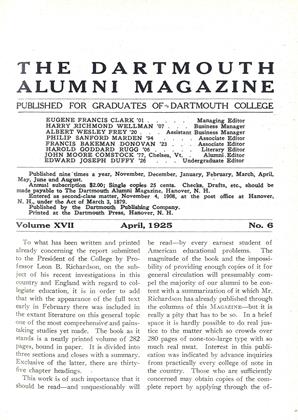Eight men were formally inducted into the New Hampshire Alpha of Phi Beta Kappa on the evening of February 27. These men, C. H. Flint, G. E, Gardner, S. C. Goding, G. R. Joslyn, B. L. Levison, D. A. Lyman, B. J. Manning and K. R. Parker, had earned this distinction by averaging 3.2 for their first three and a half years in college. This brings the undergraduate membership of the chapter to 22 since 14. other members of the 1925 class, having maintained an average of 3.4 for their first three years, were admitted at the end of their junior year. These men were G. N. Chamberlin, Jr., S. G. Chamberlin, A. W. Edson, Karl Friedmann, W. W. Jenkins, L. S. Kimball, D. W. Moore, E. W. Rosseler, J. W. Sanborn, H. E. Stevens, H. S. Talbot, R. C. Tanzer, F. B. Wallis, and T. H. Werner.
Prof. Charles H. Grandgent of Harvard University was the speaker of the evening. Taking "Windows" as the announced subject of his talk he said in part,
"In life of every sort, curiosity is constantly at odds with fear. It is hard to tell which had the greater share in influencing the evolution of the human race—necessity or curiosity. To both we owe what we have and what we are.
"Dante, in the opening of his 'Convivio', said that everything in the world is instinctively impelled to work out its own perfection. It is true that some of the greatest discoveries of all time have been made through a man's eagerness to penetrate uncharted space. Curiosity impelled Columbus, just -as it impels the astrologers who study the heavens unceasingly, night after night, in hope of discovering they know not what.
"Can it be that some day man shall know everything? Has he the capacity? And will he cease to be man when he does know everything?.... In our race to knowledge we carry our own hurdles, which always trip us."
Professor Grandgent spoke of the formal parlors of houses of other generations, formidable parlors that were musty and heavy with gloom, and that were open for business only at times of funerals and weddings. The windows of these rooms were forever shaded, he said, and those who lived in the house never looked into that curtained dusk. "Why do we have in our minds," he asked, "so many such rooms? Often it is because fashion, a somewhat imperious dame, proclaims that we should. Fashion, indeed, is a tyrant.... At any moment we may give up to her a portion of our boasted 'Free Will.'
"And while we are speaking of free will— in America it is our greatest ambition to be as much like each other as possible. Furthermore, we have a certain instinct for collectiveness If two Americans were cast up on a desert island, they would immediately set about to organize a society with a President and a Secretary-Treasurer.
"The collective intelligence, or the oversoul, as Emerson called it, is the thinker. But nowadays we are different: we organize in order NOT to think. We are timid of new thoughts; we dislike the pain and labor of thinking; we dislike to be called peculiar, a title given to a man who is different from the crowd in that he thinks Samuel Butler was perfectly justified in calling Mrs. Grundy the only true goddess of humanity.
"Why should collective opinion forbid the opening of certain windows? It is able to do so because of our inertia. We think that an increase of light may hurt our eyes To raise a blind we must have some force more powerful than custom. We must have to open the windows of these dark rooms, will greater than the will not to open. But the rooms that we wish to keep dark may be entirely peculiar to ourselves, and we rejoice in them: we have the pride of authorship.
"We must all indulge in a few illusions, however. And anyway, can we really see in every direction, when we have a blind spot in one eye? All men naturally desire to know all things that will not disturb their prejudices, their pet illusions. For this reason we shall never be burdened with, omniscience. But every window opened is a. mite contributed to the understanding of the opener. Every deposit brings immediate returns. In such a way do we acquire the virtue of an open mind.
"If we had an unobstructed view of the working of our neighbors' minds, what benefit would it not bring us. Throw open the window of sympathetic understanding and your troubles will vanish. Of all the ills that beset us in this world the worst are those that arise in ourselves. The lonely man is he who gazes too much within himself.... But are we not all unlucky? for we are; every one fellows in misfortune and iniquity."
 View Full Issue
View Full Issue
More From This Issue
-
 Article
ArticleThe Oldest Building on the Campus
April 1925 By Professor Herbert D. Foster '85 -
 Article
ArticleTHE OLD SONGS
April 1925 By Professor Edwin J. Bartlett '72 -
 Article
ArticleTo what has been written
April 1925 -
 Article
ArticleFROM THE UNDERGRADUATE CHAIR
April 1925 -
 Class Notes
Class NotesClass of 1917
April 1925 By Ralph Sanborn -
 Class Notes
Class NotesClass of 1903
April 1925 By Perley E. Whelden








